The End of an Era and
New Beginnings
Most people would have expected the Snow Hill church to
be a feature of Wolverhampton's skyline for many years
to come. Unfortunately this was not to be, and the
church's difficulties rapidly grew. The building had
structural problems and in August 1941 part of the gable
end collapsed, resulting in a lot of damage to the
building and subsequent demolition. For the next ten
years services were held in the schoolrooms while plans
had to be made for a replacement church.
The minister at the time, the Reverend Louis Mares,
found the 1940s very difficult indeed. Not only did he
have to continue the work of the church in cramped
surroundings, but also had to plan for a replacement
building. As such he was chairman of the building
committee that made decisions on all aspects of the new
church, from the design of the building itself, to its
location, and how the project would be funded. The
decision was taken to move the church away from Snow
Hill so that it could serve a new and growing district. |
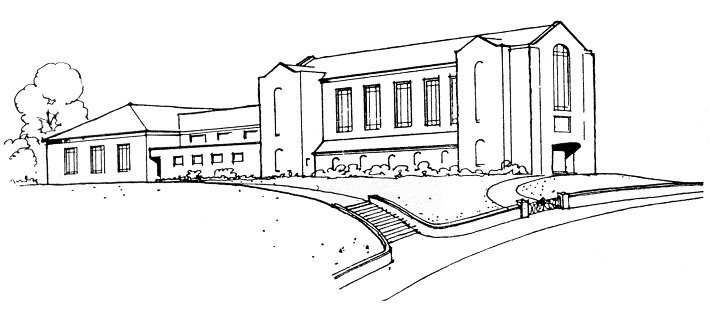
The initial design for the new church.
| After due consideration, Penn was chosen as the
district, and the existing site of today's church was
seen as the most favourable location in preference to
other available sites in the area. The land, purchased
by the Congregational Union of England and Wales for
£2,400, used to be part of the Woodlands Estate and had
two local names; Fox Fields and the Cabbage Patch. The
footpath alongside the site is part of the original
track that ran from St. Bartholomew's Church to St.
Philip's Church. |
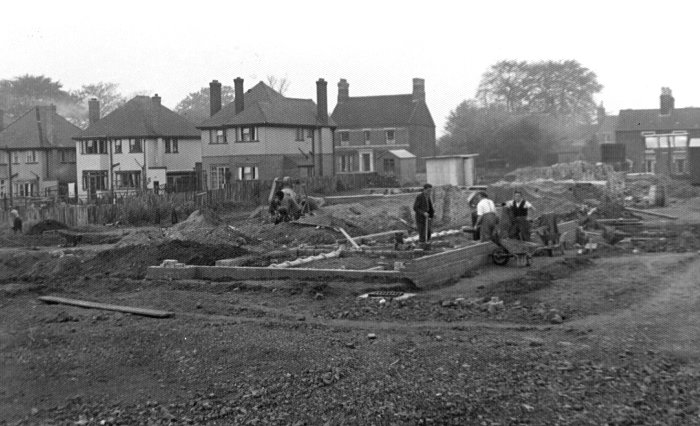
Construction begins. Courtesy of
Lawson Cartwright.
| Soon after acquisition the site was dedicated at a
ceremony on 22nd July, 1950 and a stone laying ceremony
took place on 16th September.
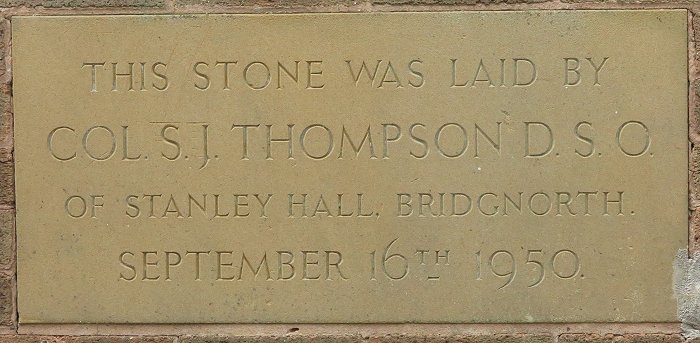
The first design for the church was for a building
with the gable end and entrance facing the Penn Road,
and adjacent buildings at the rear. The design was soon
changed however, into what we see today. |
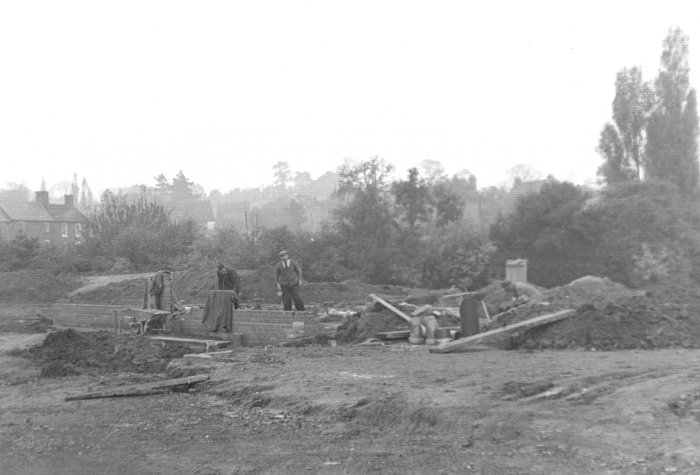
The site on 20th October, 1950. Courtesy
of Lawson Cartwright.
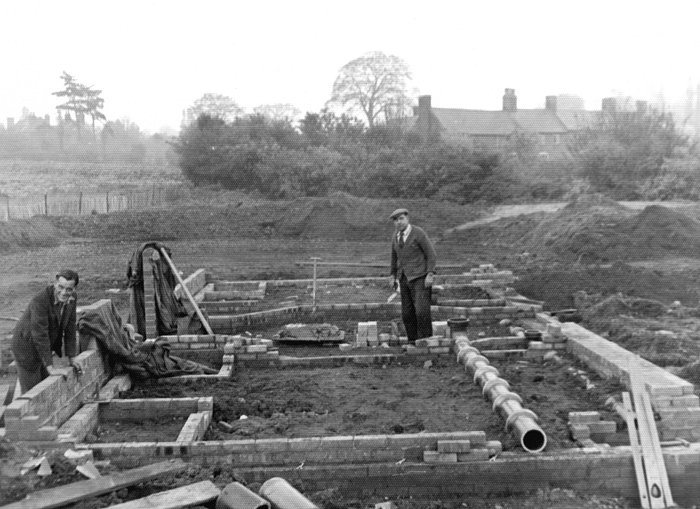
Another view from the 20th October, 1950.
Courtesy of Lawson Cartwright.
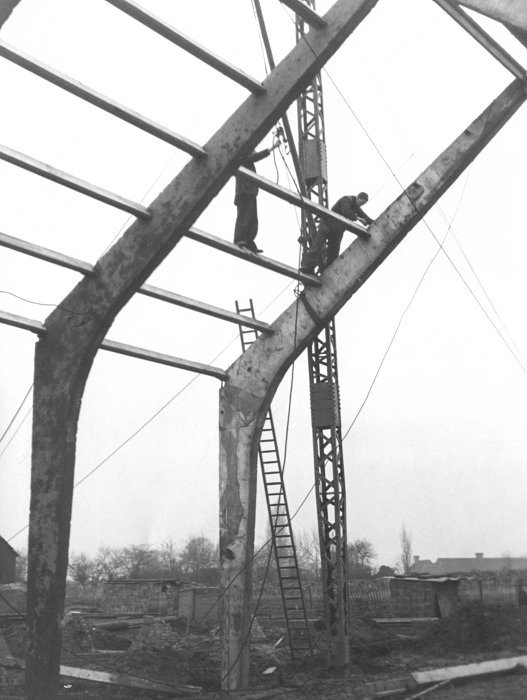 Danger. Men at work. 3rd February 1951.
Courtesy of Lawson Cartwright.
Danger. Men at work. 3rd February 1951.
Courtesy of Lawson Cartwright.

The building appears. 7th April 1951. Courtesy of
Lawson Cartwright.
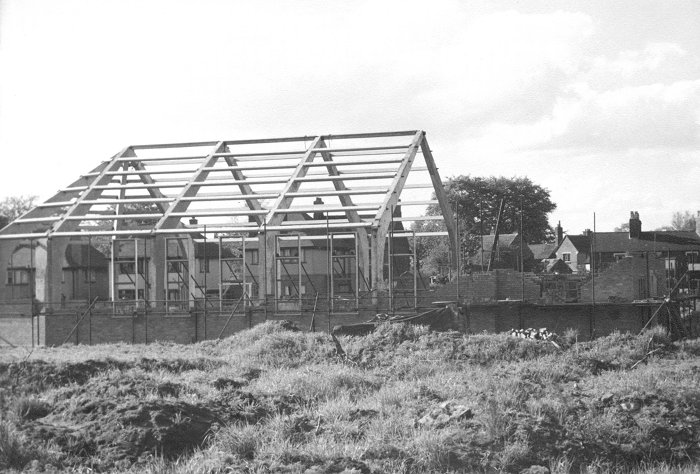
The west end starts to take shape.
Courtesy of Lawson Cartwright.
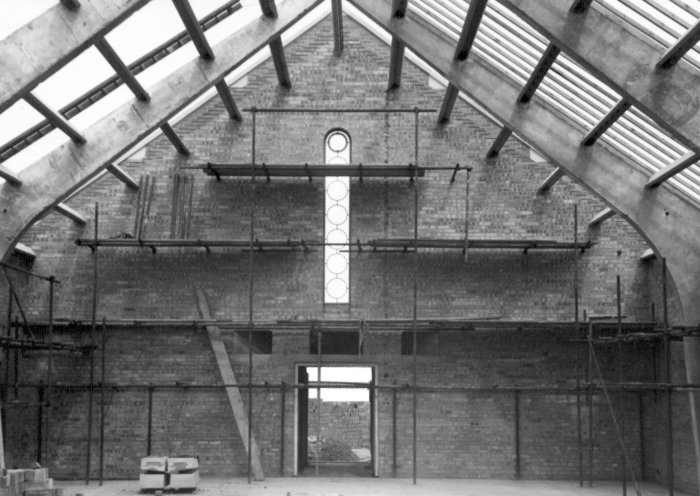
The east end and the main entrance.
Courtesy of Lawson Cartwright.
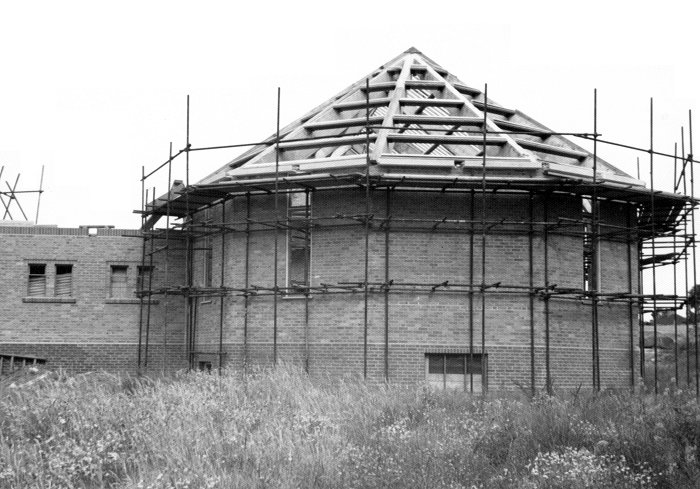
A view from the 15th July, 1951. Courtesy
of Lawson Cartwright.
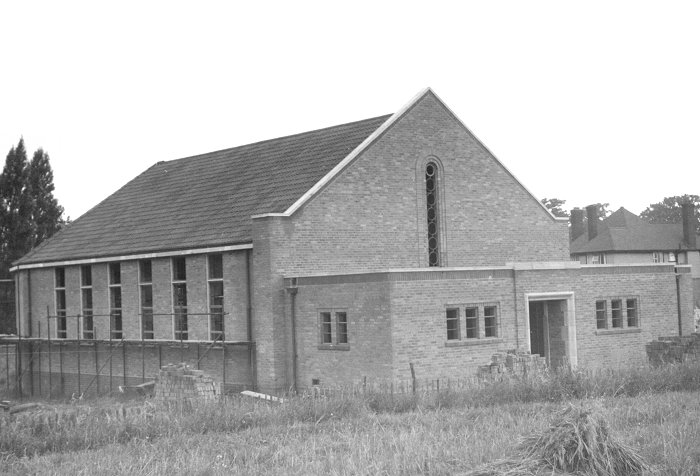
Nearing completion. 16th September, 1951. Courtesy of
Lawson Cartwright.
| Building work rapidly progressed and the new church
opened its doors for the first time on 6th December,
1951. Installed in the building is a four-rank Compton
pipe organ with a detached console.
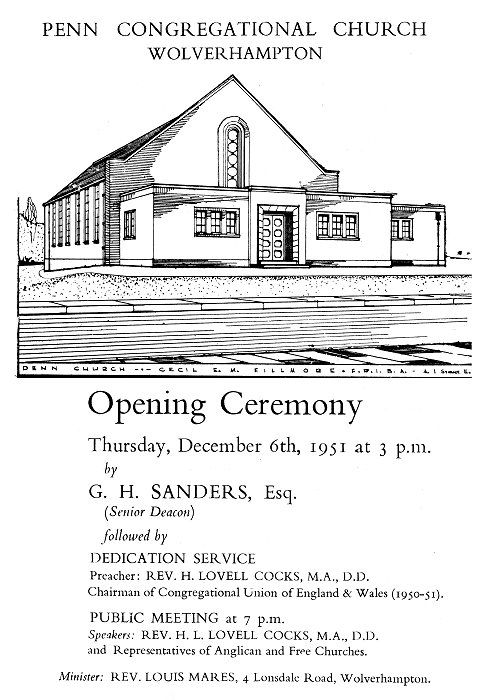
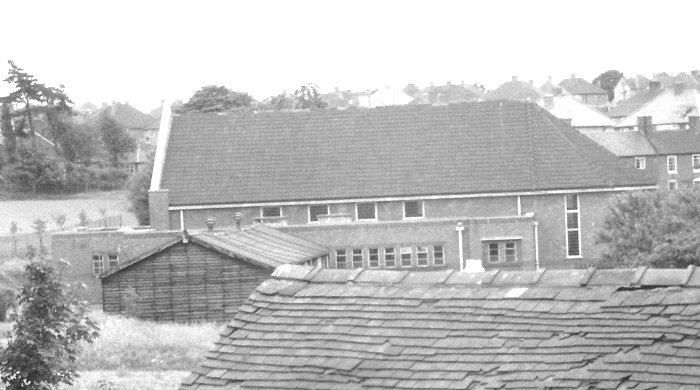
A photo from the
early 1960s showing the temporary wooden
building that was replaced by the church
hall in 1963. Courtesy of Mary Harding. |
In 1962 the Rev.
M. J. Husselbee became minister and the church hall
opened on 15th February, 1964. Two years later the Swan
Bank Congregational Church closed for the last time and
its members moved to the Penn Road church. The church
officially became Penn United Reformed Church in 1972. |
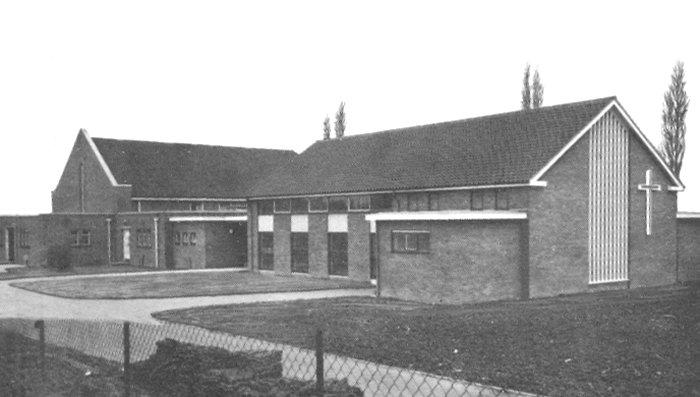
A view from spring 1964. Courtesy of
Lawson Cartwright.
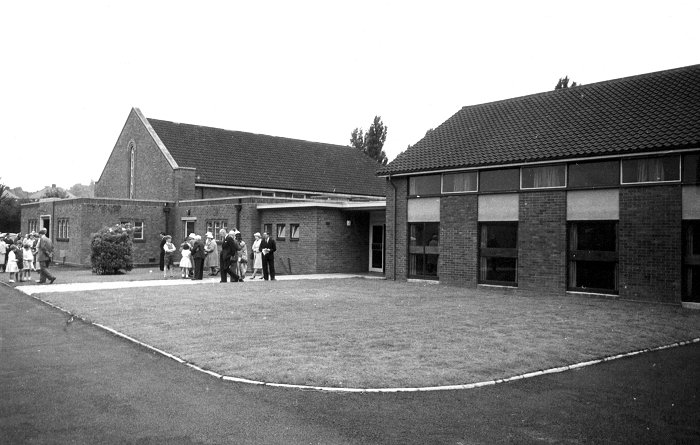
A busy Sunday in the 1960s. Courtesy of
Lawson Cartwright.

The church interior in 2009.

The church hall. As seen at the 2018 Penn
History Fair.
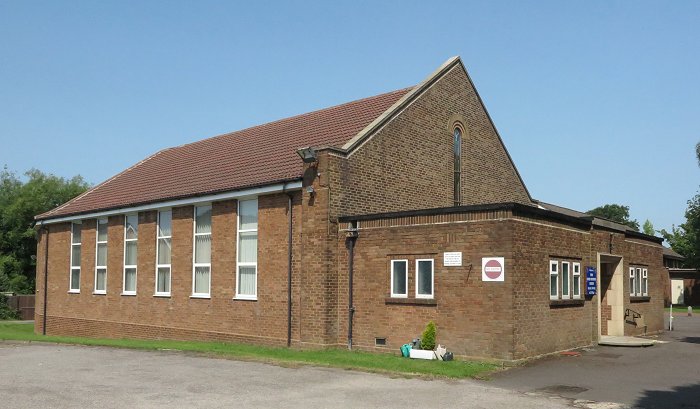
The church today.
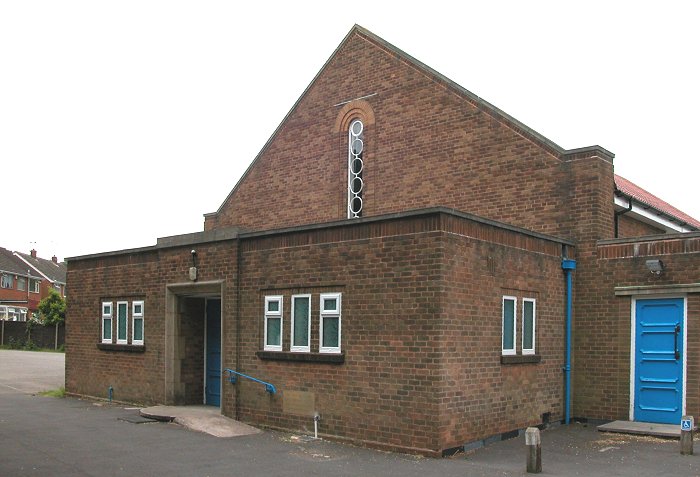
The east end and the main entrance.
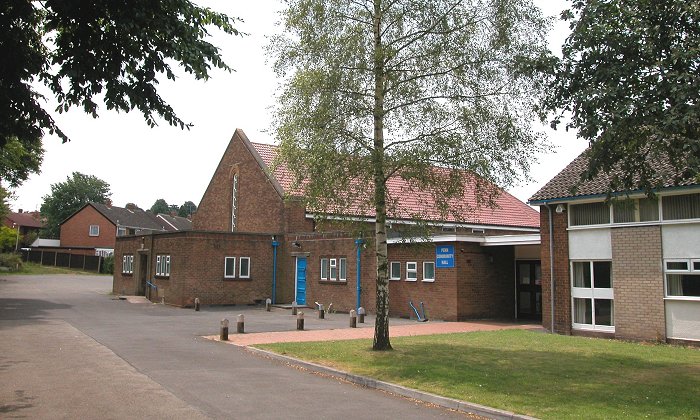
The church and church hall.
The church continued it's tradition of forming links
with other churches, and entered into a covenant between
itself and the other three main churches at Penn, on
20th January, 1985. The members are:
Penn United Reformed Church
Springdale Methodist Church
St. Bartholomew's Church (C. of E.)
St. Michael's R.C.
Church. |
Penn United Reformed Church is now at the centre of
Penn's community life. It is one of the few community centres
in the area, and is frequently used and greatly
appreciated by all.
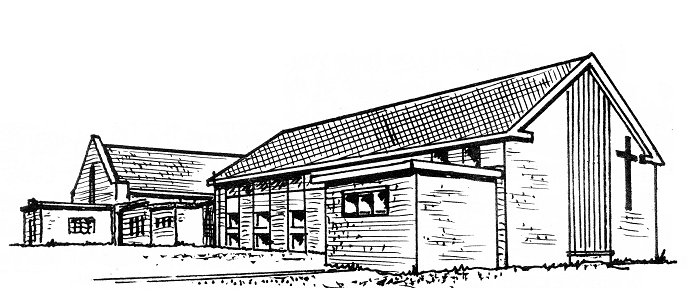
References:
Congregational Churches of Wolverhampton, 1662-1894.
W.H. Jones. Alexander & Shepheard, 1894.
The Congregational Churches of Staffordshire. A.G.
Matthews. Congregational Union of England and Wales,
1924.
History of Wolverhampton to the Early Nineteenth
Century. Gerald P. Mander and Norman W. Tildesley.
Wolverhampton C.B. Corporation, 1960.
Varnished Leaves. Charles Nicholas Mander. Owlpen Press,
2004.
The History of the Fellowship of the Church now known as
Penn United Reformed Church.
L. Wilson. |
 |
|
 |
Return to Snow Hill
Congregational Church |
|
Return to the
beginning |
|

